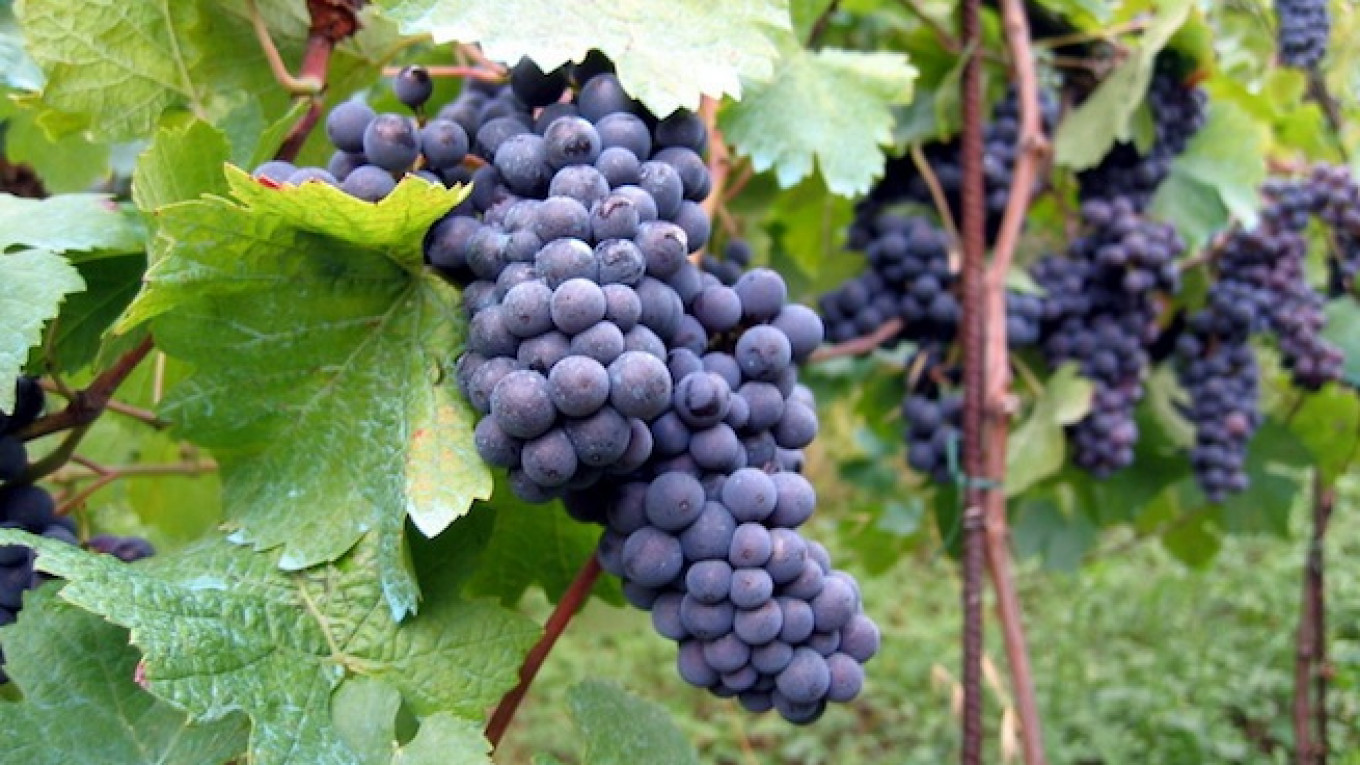The government plans to almost double Russia's wine-making territory by 2020, setting itself against foreign importers, local counterfeiters and almost three decades of Soviet and Russian neglect.
In a meeting this week at the Arbau-Durso winery in Russia's wine-producing region of Krasnodar, between the Caspian Sea and Ukraine, Prime Minister Dmitry Medvedev set the aim of boosting the total territory of Russian vineyards to 140,000 hectares in 2020 from 90,000 hectares now. Medvedev also raised the possibility of freeing wine from the laws governing alcohol production — potentially liberating the wine industry from regulations such as the ban on advertising in locations other than the point of sale.
"There are independent laws on this subject in the majority of countries, maybe it makes sense for us to go the way of the French and most grape and wine producers in general," Medvedev said, according to a transcript on the government's website.
But behind the forward-looking rhetoric, the situation is bleak: Russian grape production has fallen to 325,000 tons a year, just 40 percent of its level in the 1980s, Medvedev said. The industry is also plagued by counterfeit products and Russian producers who import their raw materials from abroad.
In the absence of state support, wine-making has foundered in Russia over the past 25 years. According to Vadim Dobriz of the Russian Regional and Federal Alcohol Markets Studies Center, the total area of vineyards has fallen from 190,000 hectares during the former Soviet Union to 60,000 hectares today, plus the 30,000 hectares Russia gained with the annexation of Crimea in March.
Former president of the Soviet Union Mikhail Gorbachev did not help matters. An anti-alcoholism campaign carried out under his rule in the 1980s led to the destruction of numerous vineyards, especially in the republic of Dagestan, where the state employed people to take axes to the vines. The total area of wine-making territory in Russia fell from 200,000 hectares in the early 1980s to 168,000 hectares in the second half of the decade, according to RosBusinessConsulting.
As local growers vanished, French, Spanish and Italian wines have flooded into the market along with foreign-produced "must," or the raw grape juice from which wine is produced. Forty percent of the wine drunk in Russia last year was imported from abroad, and an additional 30 percent was made in Russian from foreign materials, Dobriz said. Russia produced a total of 97 million liters of wine in the first four months this year, according to the State Statistics Agency.
The government began taking action last year, recognizing wine as an "agricultural product" eligible for state subsidies, and designating 300 million rubles ($8.7 million) to support the industry in 2014. Compared to other countries, however, the support is miserly.
In Russia, the state compensates from 10 to 20 percent of the cost of grape cultivation, while in most countries the government compensates from 60 to 80 percent, Alexander Tkachyov, governor of the Krasnodar region said during the meeting. "This is why we have no market, this is why our production is not expanding and moving forward," Tkachyov said.
Low subsidies and costly licensing and monitoring costs have made wine-making impossible for all but the largest producers and those who purchase their raw products abroad, Tkachyov said.
If the government chose to commit real resources to support the sector, Russia could expand its wine-making territory by up to six times their current area, according to Dobriz. "We are in no way worse in our potential than France, Italy, Spain, Argentina, Chile and so on," he said. As of 2007, France's vineyards covered an area of more than 860,000 hectares, according to FranceAgriMer.
Contact the author at d.damora@imedia.ru
A Message from The Moscow Times:
Dear readers,
We are facing unprecedented challenges. Russia's Prosecutor General's Office has designated The Moscow Times as an "undesirable" organization, criminalizing our work and putting our staff at risk of prosecution. This follows our earlier unjust labeling as a "foreign agent."
These actions are direct attempts to silence independent journalism in Russia. The authorities claim our work "discredits the decisions of the Russian leadership." We see things differently: we strive to provide accurate, unbiased reporting on Russia.
We, the journalists of The Moscow Times, refuse to be silenced. But to continue our work, we need your help.
Your support, no matter how small, makes a world of difference. If you can, please support us monthly starting from just $2. It's quick to set up, and every contribution makes a significant impact.
By supporting The Moscow Times, you're defending open, independent journalism in the face of repression. Thank you for standing with us.
Remind me later.






